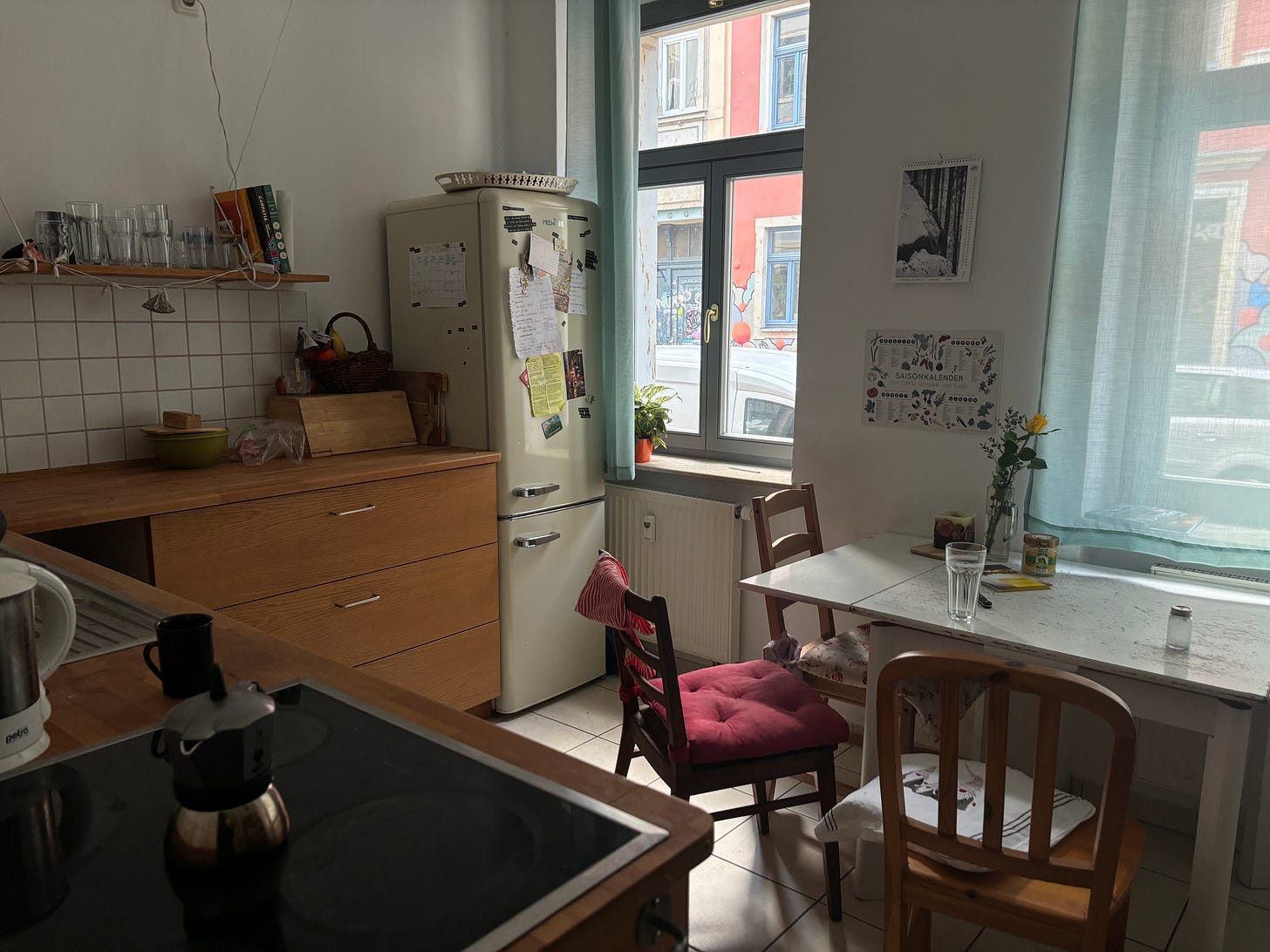Floor potatoes, communal towels and other WG adventures
They weren't kidding about the Gemeinschaft part.
DRESDEN, Germany — I keep a few secrets from my new roommates.
In my room, I hide single-use wipes and paper towels, as well as a coffeemaker that uses disposable pods. (I hope they don’t hear it rumbling as it pulls my first cup each morning.)
I also keep my own bath towels in my room, which might not be a secret exactly, but it is an act of rebellion against my apartment’s particular brand of communal living. When I moved in, one of my roommates told me I could avail myself of the towels stacked on a shelf in the bathroom.
Die Badetücher sind für alle, she told me. The bath towels are for everyone.
Well, maybe not for me, I thought. I had no idea how often those towels were getting washed or how much cross-pollination was going on. After a month in the WG, I’m still not totally sure.
Another secret: I’m not vegetarian. Or pescatarian, or flexitarian. I don’t even really “avoid meat,” as I vaguely told my roommates when I first met them. I just don’t cook it in our apartment’s kitchen.
Living in a WG, or a flatshare, is pretty different from living with roommates in the U.S. Even the name hints at that — WG stands for Wohnungsgemeinschaft, or “apartment community.” In many German WGs, there are expectations for communal living and social life that don’t exist in a typical shared apartment in the U.S.
WGs are popular among young people in Germany, particularly in cities. There’s even an online platform specifically dedicated to connecting WGs with potential roommates. This platform, WG-gesucht.de, is how I found my current place.
I’m one of four in my WG. I’m the youngest by a pretty significant margin — Luisa is 27, Alex is 29 and Martin is 31. That the ages represented in our WG span nearly a decade is not particularly unusual, according to my German friends. It’s also pretty common for men and women to live together in WGs.
What’s apparently slightly unusual (though not unheard of) is that Luisa and Martin are in a relationship with each other.
Recently, I accidentally intruded on some kind of private moment between the two of them in the hallway outside my room. When I blurted out, “Oh, I’m sorry!” in English, Martin also seemed to freeze. “Um, you’re welcome!” he replied.
But awkward moments aside, I’d much prefer my living arrangement to some situations I’ve heard of. And frankly, as a refugee from the wrong side of the Hauptbahnhof tracks, I would have been willing to accept something much weirder.
I went to a party recently at a WG where a couple lived with a third roommate whom they barely knew. I’ve seen online ads posted by couples with babies looking for roommates. I’ve met people who live with roommates in their 60s or 70s. (This is more common in Berlin, where people are genuinely desperate for housing.)
In the U.S., I would’ve steered a mile clear of any living situation that included a 31-year-old man. (Sorry Martin.)
Most people I know in New York, D.C. and Chicago live with roommates they already knew in college, or friends of friends or people who were at least in the same graduating class at a different university. I would have been somewhat surprised if any of my friends in the U.S. told me they were living with a roommate older than 24.
But to my American readers — it’s really not that weird once you get used to it. I mean, we’re all adults with jobs (kind of).
What also makes my WG experience different from my experiences living with roommates in the States is how much sharing is expected. (As the communal towels may have indicated.)
For instance, in my WG, if I put anything in the fridge without expressly labeling it as my own, it becomes fair game for anyone in the apartment.
At one WG I toured back in November, my would-be roommate, who was vegan, told me she expected us to share all of our groceries and cook our meals together everyday.
It was the first WG I had toured, and this proposed arrangement totally surprised me. And what she described is a pretty strict arrangement, even by WG standards. But I would soon learn that communal groceries and cooking are more the norm than I expected. (Mercifully and unsurprisingly, I was not invited to move into that WG.)
When I go grocery shopping, I ask in our WhatsApp group if anyone needs me to grab anything. And at our first WG meeting, I was told that when we go grocery shopping we should keep the other roommates in mind. Martin likes cheese, Luisa likes bananas, so if I notice we’re out of any of these things, I should grab more.
I lived in two different houses with my best friends during my junior and senior years of college. By the time we moved into our first off-campus house together, the seven of us were already close. We spent a lot of our time in the house socializing with each other, watching TV, doing homework or just chatting. We also went to all the same parties, and we would text in the group chat before going to the library or running errands to see if anyone wanted to join.
But we didn’t cook dinners together, and we definitely didn’t share our groceries. I also did not “keep them in mind” while shopping for my own groceries. I shared a kitchen with four other people my junior year and two other people my senior year, and we always had our own shelves and drawers in the fridges and pantries. If I had taken someone’s food without asking, it would’ve been World War III.
Notably, my WG doesn’t have a TV, or really a living room space at all. The room that could support that infrastructure is partially configured as a carpentry workshop for Martin and partially as a practice room for Luisa and her accordion. (Right now, she’s working on “Money, Money, Money” by ABBA.)
Without a living room, the main place we socialize is in the kitchen, cooking and eating meals together. Often, I’ll start cooking dinner for myself, and before long one or more of my roommates will join me.
Dinner in the WG is always vegetarian, and it usually consists of three or more vegetables prepared in three or more ways. We belong to a Solawi — a Solidarische Landwirtschaft, or a community-supported agriculture program. This provides us weekly with plenty of cabbage, potatoes and other vegetables, some of which are completely unfamiliar to me.
One night during my first month in the WG, I was cooking dinner with my roommates, when one of them dropped a potato on the floor. Trying to be helpful, I picked it up and tossed it in the compost bin. Alex darted after me, grabbing the potato out of the compost bin, rinsing it off and putting it back in the boiling water.
Reflecting on it further, I probably could have observed the five-second rule here. (In my defense, when I used to cook with Jeremy, anything that hit the ground would go immediately in the trash, and I think the habit stuck.) For fear that my roommates would be aghast that I would eat floor food, I thought I was taking the safest route. And I even thought I was being extra good by using the compost bin.
When something like this happens, I’ve started asking myself, “Am I crazy, are they crazy, or is it just a German thing?” And maybe behind my back, my roommates ask each other, “Is she crazy, or is she just typisch amerikanisch?”
I usually consult one of my German friends to figure out if what I’m experiencing is typical WG life, or if my roommates are a little odd.
So far, I’ve learned that rescuing fallen food from the floor is totally normal, but rescuing it from the compost bin is not. Most Germans, unlike my roommates, do use paper towels in their kitchens. And I’ve heard mixed reactions about the bath towel sharing situation.
Even after almost two months in the WG, I’m working overtime to be a good roommate and to navigate these new expectations. We needed a new chair for our kitchen table, so within a day, I found us a new chair on Kleinanzeigen. I keep my showers brief (and I turn off the water when I’m not actively rinsing off). I always unload the dishwasher when I find it full.
Still, I’ve really come to cherish the friendships I’ve developed with my roommates and the evenings we spend in our kitchen. Last week, we sat together after dinner to make BINGO boards with our goals for the new year.
My roommates are also incredibly patient with my German. Instead of switching to English as soon as I start to struggle, they slow down, repeat themselves and explain things in clearer terms. It’s been incredible for my language acquisition, and through these muddled conversations, I feel like they’re really becoming my friends.

Truly, this is what I hoped I’d find when I terminated my university housing contract back in November. And already, my memories of Budapester Straße are fading away like an ugly, Soviet-era dream. ▣







